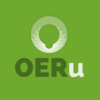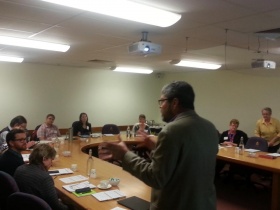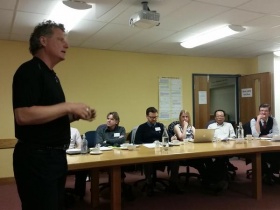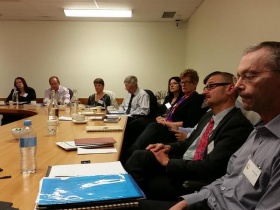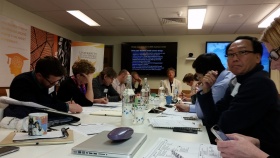New Zealand OERu 15.08 Oceania regional meeting
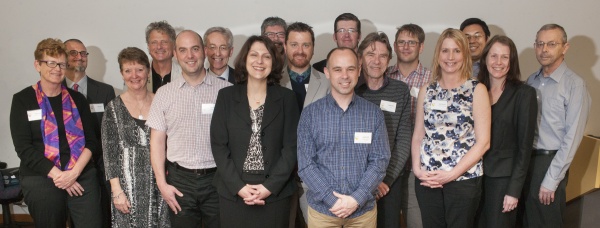
From left to right: Lynne Vautier, Curtin University; Ken Udas, University of Southern Queensland; Katherine Klapdoor, Charles Sturt University; Paul Stacey, Creative Commons; Dave Lane, OER Foundation; Dave Smith, Charles Sturt University; Carina Bossu, University of Tasmania; Wayne Mackintosh, OER Foundation and Otago Polytechnic; Timothy McCallum, University of Southern Queensland; Blair Hoad, Waikato Institute of Technology; Adrian Stagg, University of Southern Queensland; David Bull, University of Southern Queensland; Aidan Bigham, Waikato Institute of Technology, Jenny Millea, University of Canberra, Xiang Ren, University of Southern Queensland; Helen Partridge, University of Southern Queensland, Jim Taylor, University of Souther Queensland and OERF Board of Directors.
Representatives from Charles Sturt University, Creative Commons, Curtin University, OER Foundation, Otago Polytechnic, University of Canberra, University of Southern Queensland, University of Tasmania and Waikato Institute of Technology convened in Toowoomba for the inaugural OERu Oceania Regional meeting on 27 August 2015.
The purpose of the meeting was to design, discuss and develop open business models from the perspective of OERu partner institutions. The outputs from this meeting and the North American Regional meeting will be tabled at the OERu 2015 Partner's and Chief Executive Officers meetings in October 2015 in South Africa.
Paul Stacey, Associate Director of Global Learning at Creative Commons was the lead facilitator for the meeting. Paul is actively involved in leading a global initiative exploring open business models based on works licensed under Creative Commons.
The outputs of this meeting are summarised in the aggregated OERu open business model canvas.
Contents
Meeting report
The OER Foundation published a dedicated site for the OERu OZ 2015-08 meeting generated from an outline of wiki pages in line with the OERu tradition of maintaining a public record of all meetings.Pre-meeting activities
Participants were invited to contribute to the following pre-meeting activities in preparation for the meeting:- Complete the OERu input evaluation survey.
- Consult the OERu Strategic Plan 2015 - 2017.
- Review the first draft of an OERu open business model developed from the perspective of the OER Foundation.
- Contribute to open business model conversations on community.oeru.org.
Orientation
Professor Ken Udas, Deputy Vice-Chancellor (Academic Services) and Chief Information Officer at the University of Southern Queensland opened the meeting with the Acknowledgement of Country. He welcomed OERu partner representatives from Australia and New Zealand and our international facilitator from Canada to the inaugural Oceania Regional Meeting.
Wayne Mackintosh provided a summary and demonstration of the OERu open planning model and supporting technologies, including:
- The location of the OERu planning portal in WikiEducator.
- A summary of the OERu initiatives and planning framework for structuring implementation activities.
- Demonstration of the Quicklinks page as an access point for navigating the OERu planning pages.
- Summary of the OERu organisation into working groups and the role and function of the OERu Management Committee.
Participants who are not currently members of any of the OERu working groups were invited to register and join our international open planning and implementation team.
Wayne highlighted two new open source communication technologies used to support the planning and implementation of the OERu:
- groups.oeru.org which functions as an open email list with a public record of the working group conversations. This is an opt-in system. Users can self-register or the conveners of working groups will email invitations to join the respective list.
- community.oeru.org site which will become the main communication hub of the OERu community. This is an early pre-launch version of the site and participants were invited to assist with populating the community.oeru.org with authentic questions in preparation of the main launch of the technology.
Wayne reported on the current state of play of the OERu collaboration referring to the Strategic Plan 2015 - 2017 noting that steady progress is being made on the achievement of the majority of key performance indicators. However, he highlighted that, while the OERu has exceeded the target number of course nominations, the network is lagging behind on the number of course completions available for delivery.
Designing and developing open business models for the OERu
- Slides: Open Business Models prepared for OERu Oceania Regional Meeting.
Paul Stacey affirmed the aims of the meeting, namely to design and develop open business models from the perspective of the individual OERu partner institutions noting alignment with the OERu's Strategic Goal 3: "Achieve a fiscally sustainable and scalable OERu network". The outputs of the regional open business model meetings will be tabled at the annual meeting of OERu partners and Council of CEO's meeting in October 2015 in South Africa.
Getting open business model design juices flowing
Paul commenced the session by comparing the closed and open innovation paradigms drawing on the work of Chesborough (2006)[1]. Paul referenced the successes of the open source software movement highlighting different business approaches from Raymond's (1999) seminal publication documenting the GNU/Linux development model: The Cathedral and the Bazaar[2]. The group was invited to explore and share thoughts on a number of open business models:
- Why give away your work for free? - looking at how the novelist, Cory Doctorow publishes novels for free online while sustaining sales.
- Nina Paley's film, Sita Sings the Blues which can be downloaded for free under a CC-BY-SA license.
- The revenue model of the Rijksmuseum providing free access to digitised versions of the museums art collection.
- Examining the Commons with particular reference to a number of publications on the Commons (see Slide 18).
- Discussion of Flickr's controversial "Wall Art program", where revenue generated from selected CC-BY licensed images hosted on Flickr and printed for resale did not include revenue sharing with the copyright holders, when compared to the revenue sharing model used in the case of all rights reserved images.
Developing individual business models
The approach used for the meeting is derived from the book, Business Model Generation (Osterwalder & Pigneur 2009)[3], co-created by 470 practitioners from 45 different countries. The canvas concept is designed to explain a "business on a page". See for example this Open business model canvas template.
Paul summarised the canvas and tasked participants to individually develop an open business model using the handout sheets for their respective institutions. Paul recommended that participants fill out selected blocks of the canvas in the following sequence:
- Customer segments
- Value proposition
- Social good
- Revenue streams.
The individual work session was followed by a plenary discussion where participants shared ideas from their draft business models. The canvases were posted as a gallery on the wall for participants to explore further. The OER Foundation has taken photographs of the first draft open business models produced by individual participants. However, as these were produced individually without participants having the opportunity to discuss internally with their respective organisations, the data will be used to produce an aggregate version for an OERu "partner-perspective" business model.
Next steps
True to the OERu traditions of incremental design, we recognise that the development of open business models is an iterative process.
The open business model inputs, generated during this Oceania Regional Meeting and the forthcoming North America Regional Meeting, will be discussed and refined during the international OERu Partners Meeting in South Africa on 7-8 October 2015. These refinements will then be incorporated into the OERu business model to be tabled at the OERu Council of CEOs Meeting on 9 October 2015.
Participants were invited to:
- Discuss the initial draft of their open business model with colleagues at their respective OERu partner institutions.
- Submit a refined version of their business model by 15 September 2015 preferably in WikiEducator (see instructions). These submissions will be used for preparing an "aggregated" OERu open business model(s) to be discussed at the partners meeting in October 2015 before tabling at the CEOs Meeting. (Note that we will not be able to incorporate your ideas in the absence of open submissions.)
- The aggregated business model will be developed transparently in the wiki to promote open consultations and collective refinement.
Action items and key decisions
- Participants who are not currently participating in any OERu working groups are invited to join an active working group.
- Participants are invited to assist with populating the new community.oeru.org site with authentic content and conversation prior to the main launch of the site.
- OERu partners are invited to submit an open business model online for their organisation by 15 September 2015. (See instructions on how to submit a canvas in the wiki.)
- OER Foundation to develop an aggregated OERu business model openly in the wiki for the October 2015 meetings.
References
- ↑ Chesborough, H.W. 2006. Open Innovation: The New Imperative for Creating and Profiting from Technology. Harvard University Press
- ↑ Raymond, Eric S. (1999). The Cathedral and the Bazaar: Musings on Linux and Open Source by an Accidental Revolutionary.
- ↑ Osterwalder, A and Pigneur, Y. (2009) Business Model Generation. Strategyzer.
